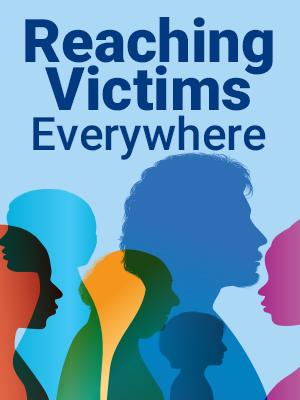Archival Notice
This is an archive page that is no longer being updated. It may contain outdated information and links may no longer function as originally intended.
Elder Abuse and Financial Exploitation
Older adults are especially vulnerable to violent crime, neglect, and exploitation, including financial fraud. The effects of these crimes can be devastating, and older adults may be targeted at rates that outpace the services available to help the growing number of victims. Not surprisingly, elder abuse results in a wide range of negative health impacts, including the increased likelihood of injury and chronic health conditions. We know from research in this area that older victims of violence have additional health care problems and higher premature mortality rates than non-victims, and that older victims of even modest forms of abuse have dramatically (300 percent) higher morbidity and mortality rates than non-abused older adults.[2] Further, elder abuse may be difficult to detect, as the perpetrator may be a caretaker, family member, or other individual on whom the victim must rely for basic needs. Therefore, victims may be reluctant to report a crime if it requires reporting a family member or results in a loss of personal independence.
OVC supports advocates, service providers, researchers, and policymakers across the Nation in their efforts to address the rights and needs of older victims of abuse and neglect. The Victims of Crime Act (VOCA) formula grant program provides funding for crime victim compensation and assistance, which is awarded through subgrants to state and local agencies and local service providers.
In FYs 2019 and 2020, the VOCA victim assistance grant program supported 7,166 organizations serving at least one individual ages 60 or older. Victim service providers receiving VOCA subgrants served a total of 707,477 older victims[3] between FY 2019 and FY 2020, representing 5 percent of new victims served over the 2-year period. During that period, an average of 27,843 victims per quarter sought services for elder abuse or neglect.
Among the VOCA-funded organizations for which older victims accounted for 75 percent or more of the new victims served, the top five most common types of victimizations were elder abuse (43 percent); identity theft, fraud, and financial crime (14 percent); domestic and family violence (7 percent); adult physical assault (5 percent); and burglary (3 percent). All 54 of the VOCA victim compensation grantees served victims ages 60 and older. The crimes most commonly associated with elder abuse and neglect served by VOCA victim compensation grantees were assault, fraud and financial crimes, robbery, burglary, and homicide.
A total of 13,361 individuals ages 60 and older applied for compensation benefits in FY 2019 through the VOCA victim compensation grant program. In FY 2019, VOCA-funded organizations paid 1,430 compensation claims related to elder abuse or neglect, an 11 percent increase from FY 2018.
In FY 2017, OVC began the Field-Generated Innovations in Addressing Elder Financial Exploitation Program. Through this program, OVC awarded a total of $3.4 million to eight sites to focus on elder financial exploitation through innovative collaborations between the financial industry and others, to better detect and respond to victims. The culmination of their efforts, released in FY 2020 and placed on DOJ’s Elder Justice Initiative website, includes a curriculum that educates judicial, justice, and community professionals about financial exploitation and elder abuse; training videos featuring the voices of older survivors; a digital dashboard for hospital emergency departments to screen for elder abuse victims; and curriculums to help victim advocates become elder justice advocates.
The Transforming America’s Response to Elder Abuse: Mobilizing Attorneys for Older Victims of Abuse & Financial Exploitation program provides increased legal services for older victims of crime—particularly in rural areas—to educate attorneys and allied professionals about the needs of older victims, and to increase coordinated multidisciplinary responses in supporting older victims of crime. The grantee, Equal Justice Works, has placed fellows in seven OVC-funded legal clinics across the country to further promote building pro bono capacity in the field. Between July 1, 2020, and December 31, 2020, a total of 478 older crime victims were provided with direct legal services and hundreds of others were provided legal information or were directed to appropriate external services. During the same time period, the grantee provided 25 trainings to nearly 600 professionals, conducted 217 outreach activities, and developed 46 new partnerships.
Elder abuse cases are complex, often requiring multiple systems to effectively respond to them. In FY 2019, OVC awarded nearly $5 million under the Transforming America's Response to Elder Abuse: Coordinated, Enhanced Multi-Disciplinary Teams (E-MDTs) for Older Victims of Abuse and Financial Exploitation program, which supports elder abuse multidisciplinary teams as E-MDTs at the rural, tribal, local, and state levels, including existing and new teams. Developing an MDT is recognized as a potentially powerful solution that communities can initiate in response to elder abuse. The teams reduce service duplication and effectively respond to victims' myriad needs, improving the care that would have been provided had the organizations and systems acted in isolation.
Between FYs 2019 and 2020, MDTs served 508 new individuals out of 17,926 total individuals served. Of the total individuals served by the MDTs, elder abuse or neglect was the most common victimization type, accounting for 50 percent of the victimizations identified; followed by identity theft, fraud, and financial crime (8 percent); and domestic and/or family violence (7 percent). The most common services provided included referrals to other services, supports, and resources (17,487 occurrences); crisis intervention (1,036 occurrences); and hotline/crisis-line counseling (203 occurrences). The MDTs average 122 partners per quarter, with an average of 26 partners receiving funding per quarter.
To further support MDTs, OVC awarded more than $2 million to establish the National Elder Abuse MDT Training and Technical Assistance Center to provide case consultations and training and technical assistance (TTA) to OVC-funded tribal and non-tribal MDTs throughout the country. Given the unique constraints imposed by the pandemic and the typical nature of MDT meetings, the center provided innovative strategies and materials for each team's daily operations, including useful techniques to conduct virtual team meetings; technical assistance for team support and case consultations; training for professionals serving teams; guidance on integrating specialty services into the work of the teams; strategies to ensure responsiveness to each community; guidance on trauma-informed and trauma-responsive approaches; and advice on sustainability and long-range funding strategies.
Between FY 2019 and FY 2020, the MDTs provided 9 trainings to 164 participants, including victim service providers, legal service providers and courts, community-based organizations, government officials, medical professionals, and health care providers. They also completed 39 technical assistance requests for 184 recipients.
DOJ Launches National Elder Fraud Hotline
In March 2020, the Attorney General announced the launch of the DOJ National Elder Fraud Hotline. The toll free hotline, managed by OVC, provides services to all adults ages 60 and older who may be victims of financial fraud. The hotline connects victims with experienced case managers who provide personalized support to assist callers in reporting suspected fraud to the relevant agencies, and offer resources and referrals to other appropriate services, as needed. If requested, case managers will also complete a complaint form for the Federal Bureau of Investigation (FBI) and/or the Internet Crime Complaint Center for Internet-facilitated crimes, or submit a consumer complaint to the Federal Trade Commission, when applicable. From the launch through September 29, 2020, the hotline received 4,448 calls.[4] OVC continues to explore ways to enhance the delivery of services to older Americans who are victims of fraud, for example, by working more closely with Department components with investigative and prosecutorial authority.
In FY 2020, OVC awarded $1,940,738 to the National White Collar Crime Center to work with the International Association of Chiefs of Police to develop training for law enforcement to improve identification of and response to elder fraud victims. This national-scope TTA grant will fund a study of current resources available for, and responses to, elder fraud in both a rural and an urban jurisdiction in two of DOJ’s Transnational Elder Fraud Strike Force districts. It will also support the development and delivery of trainings for law enforcement to improve responses to elder fraud that are tailored to the particular needs of different types of jurisdictions.
The trainings will be tested, evaluated, and revised as needed, and then made available to rural and urban law enforcement agencies nationwide. The Transnational Elder Fraud Strike Force brings together the resources and expertise of DOJ’s Consumer Protection Branch, the United States Attorneys' Offices for six federal districts, the FBI, the U.S. Postal Inspection Service, and other law enforcement personnel.
In FY 2020, OVC awarded nearly $6 million to 12 organizations under the Enhancing Services for Older Victims of Abuse and Financial Exploitation program to support communities in providing services to older victims of abuse and exploitation using trauma-informed approaches that protect the safety and confidentiality of victims. Programs funded range from supporting an Elder MDT Leadership Team; expanding legal services; improving the outreach and engagement of programs to better serve older African American victims of abuse and financial exploitation; enhancing existing community-based services in lower-income housing communities (for older victims who may be reluctant to use or access existing services); improving case management and civil legal assistance for victims of elder abuse in Tribal communities; to expanding the efforts of the Senior Abuse Financial Exploitation Intervention and Prevention Service programs.
Psychoeducational trainings and handouts for professionals, criminal justice stakeholders and community organizations were developed as skill builders, promoting trauma-informed practices and raising community awareness about abuse of older victims and the impact to their mental and physical health.
OVC-Funded Product Released To Increase Access for Older African American Crime Survivors
In 2020, the OVC-funded National Resource Center for Reaching Victims, in partnership with the National Clearinghouse on Abuse in Later Life, released the Increasing Access to Healing Services and Just Outcomes for Older African American Crime Survivors Toolkit. The toolkit features the voices and lived experiences of older African American crime victims and offers practical ways for stakeholders and victim services providers to effectively address systemic barriers that older African American victims face in their healing and recovery processes.
In addition to national-scope TTA grants, OVC transfers discretionary funding to federal agencies to ensure that allied professionals are skilled at addressing the needs and rights of crime victims, including older victims of abuse and exploitation. In FYs 2018 and 2019, OVC provided DOJ’s Elder Justice Initiative (EJI) an additional $1.6 million to—
- produce an investigative protocol for elder abuse, in partnership with the National Sheriffs’ Association;
- develop information addressing guardianship, in partnership with the American Bar Associations’ Committee in Law and Aging; and
- convene a meeting of state and local judges to focus on guardianships, conservatorships, and power of attorneys.
OVC discretionary funding was used to—
- identify gaps in services for older victims of abuse, neglect, and financial exploitation/fraud;
- conduct listening sessions and stakeholder meetings with representatives of state and local government entities, community-based victim service providers, and other allied professionals, and federal partners;
- convene five victim-specific listening sessions with older victims at geographically diverse locations throughout the country; and
- deliver (to OVC) a gap analysis comparing existing services to those identified by older adults and professionals, and with a set of recommendations that, if adopted, would result in a comprehensive set of responses designed to optimize outcomes for older victims.
For additional information, visit the elder fraud and abuse section of OVC’s website.
[2] Lachs MS, Williams CS, O'Brien S, Pillemer KA, & Charlson ME. The Mortality of Elder Mistreatment. JAMA. 1998;280(5):428-432. doi:10.1001/jama.280.5.428; and Baker MW. Elder Mistreatment: Risk, Vulnerability and Early Mortality. Journal of the American Psychiatric Nurses Association, 2007;12(6), 313-321. doi:10.1177/1078390306297519.
[3] The term “older victims” refers to individuals ages 60 or older.
[4] The total number of calls (4,448) includes those that dropped, were disconnected, or came from people who left voicemails that did not require a call back.




